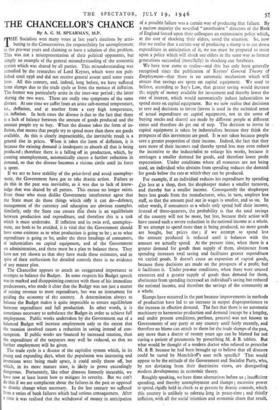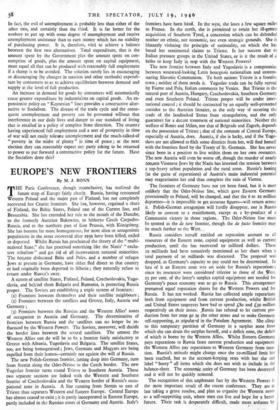THE CHANCELLOR'S CHANCE
By A. C. M. SPEARMAN, M.P.
THE Socialists won many votes at last year's elections by attri- buting to the Conservatives the responsibility for unemplOyment in the pre-war years and claiming to have a solution of this problem. This was not a misrepresentation of their political opponents, but simply an example of the general misunderstanding of the economic system which was shared by all parties. This misunderstanding was remedied by the researches of Lord Keynes, which were not pub- lished until 1936 and did not receive general assent until some years later. All this century, and, indeed, long before, we have suffered from slumps due to the trade cycle or from the menace of inflation. The former was particularly acute in the inter-war period ; the latter
during the two wars. These are really two symptoms of the same disease. At one time we suffer from an acute sub-normal temperature, i.e., deflation, and at another from a very high temperature, i.e. inflation. In both cases the disease is due to the fact that there is a lack of balance between the amount of goods produced and the amount people try to buy. When the disease takes the form of in- flation, that means that people try to spend more than there are goods available. As this is clearly impracticable, the inevitable result is a general rise in prices, When it takes the form of deflation, it is because the existing demand is inadequate to absorb all that is being produced ; therefore there is a falling off in production, which, by creating unemployment, automatically causes a further reduction in demand, so that the disease• becomes a vicious circle until its force is spent.
If we are to have stability of the price-level and avoid unemploy-
ment, the Government have got to take drastic action. Failure to do this in the past was inevitable, as it was due to lack of know- ledge that was shared by all parties. This excuse no longer exists. Even those who most dislike Government interference agree that the State must do those things which oi'y it can do—defence, management of the currency and education are obvious examples. Similarly, only the State can ensure that there is an equilibrium between production and expenditure, and therefore this is a task which it must undertake. If inflation and its twin evil, unemploy- ment, are both to be avoided, it is vital that the Government should have some estimate as to what production is going to be ; as to what expenditure is going to 'be, under the three. headings of consumers, of industrialists on capital equipment, and of the Government on administration, and there must be a plan to balance these. They have not yet shown us that they have made these estimates, and in spite of their enthusiasm for detailed controls there is no evidence of any master plan.
The Chancellor appears to attach an exaggerated importance to attempts to balince the Budget. In some respects his Budget speech was in marked and disappointing contrast with those of his immediate predecessors, who made it clear that the Budget was not just a matter of raising revenue to meet expenditure, but was an instrument for guiding the economy of the country. A determihation always to balance the Budget makes it quite impossible to ensure equilibrium between expenditure and full productioil. In other words, it is sometimes necessary to unbalance the Budget-in order to achieve full employment. Public works undertaken b3; the Government out of a balanced Budget will increase employment only to the extent that the taxation involved causes a reduction in saving instead of con- sumption. If public works are financed by increased taxation, then the expenditure of the taxpayers may well be reduced, so that no further employment will be given.
The trade cycle is a disease of the capitalist system which, in its
young and expanding days, when the population was increasing and inventions were being made apace, it could easily throw off, but which, in its more mature state, is likely to prove exceedingly dangerous. Fortunately, like other diseases formerly incurable, we have now at least learnt how to mitigate its severity. But we can't do this if we are complacent about the failures in the past or opposed to drastic change when necessary. In the last century we suffered from a-series of bank failures which had serious consequences. After a time it was realised that the withdrawal of money in anticipation
of a possible failure was a certain way of producing that failure. By a narrow majority the so-called " unorthodox " directors of the Bank of England forced upon their colleagues an expansionist policy which, at the cost of shocking their elders, saved the situation. So, now that we realise that a certain way of producing a slump is to cut down expenditure in anticipation of it, we too must be prepared to insist upon a policy which will shock our elders in the same way as former generations succeeded (mercifully) in shocking our forebears.
We have now come to realise—and this has only been generally recognised since the publication of Keynes' General Theory of Employment—that there is no automatic mechanism which will
ensure that savings are spent on capital equipment. We used to believe, according to Say's Law, that greater saving would increase th: supply of money available for investment and thereby lower the rate of interest, which would automatically induce industrialists to spend more on capital equipment. But we now realise that decisions to save and decisions to invest (invest is used in the technical sense of actual expenditure or: capital equipment, not in the sense of buying stocks and shares) are made by different people at different times and therefore do get out of step. The decision to invest in capital equipment is taken by industrialists because they think the prospects of this investment are good. It is not taken because people save a greater proportion of their income. Indeed, the fact that they save more of their incomes and thereby spend less may even reduce the incentive to the industrialist to enlarge his works, because it envisages a smaller demand for goods, and therefore lower profit expectations. Under conditions where all resources are not being used, an individual who abstains from spending reduces the demand for goods below the rate at whiclrthey can be produced.
For example, if an individual reduces his expenditure by spending ,Cso less at a shop, then the shopkeeper makes a smaller turnover, and thereby has a smaller income. Consequently the shopkeeper buys less goods from the manufacturer, who, in turn, employs less staff, so that the amount paid out in wages is smaller, and so on. In other words, if consumers as whole only spend half their income, instead of three-quarters, the probability is that the total savings of the country will not be more, but less, because their action will have caused such a severe reduction in the national income as a whole. If we attempt to spend more than is being produced, no more goods are bought, but prices rise ; if we attempt to spend less the amount produced is reduced until it balances with the amount we actually spend. At the present time, when there is a greater demand for goods than supply of them, abstinence from spending increases total saving and facilitates greater expenditure on capital goods. It doesn't cause an expansion of capital goods, because these decisions are made on the prospects of a profit, but it facilitates it. Under pre-war conditions, when there were unused resources and a greater supply of goods than demand for them, abstinence from spending increased an individual's saving but reduced the national income, and therefore the savings of the community as a whole.
Slumps have occurred in the past because improvements in methods of production have led to an increase in output disproportionate to the increase in effective demand. The fact that there is no automatic machinery to harmonise production and demand (except by a lengthy, and under present conditions, perilous, process) was not known to Governments of any party or any country until fairly recently, and therefore no blame .can attach to them for the trade slumps of the past, any more than a doctor of twenty years ago can be blamed for not curing a patient of pneumonia by prescribing M. & B. tablets. But what would be thought of a modern doctor who refused to prescribe M. & B. because he had been brought up to believe that all diseases could be cured by Menchikoff's sour milk specific? That would appear to be the attitude of the Government and Socialist Party, who, by not deviating from their doctrinaire views, are disregarding modern developments in economic theory.
Roughly speaking, we have three alternatives before us ; insufficient spending, and thereby unemployment and slumps ; excessive power to spend, rigidly held in check as at present by drastic controls, which this country is unlikely to tolerate long in peace-time ; and thirdly inflation, with all the social injustices and economic chaos that result, In fact, the evil of unemployment is prqbably less than either of the other two, and certainly than the third. It is far better for the workers to put up with some degree of unemployment and receive unemployment assistance than to earn money which has no stability of purchasing power. It is, therefore, vital to achieve a balance between the first two alternatives. Total expenditure, that is the amount spent by. the Government plus the amount spent on con- sumption of goods, plus the amount spent on capital equipment, must equal all that can be produced with reasonably full employment if a slump is to be avoided. The solution surely lies in encouraging or discouraging (by changes in taxation and other methods) expendi- ture by consumers so as to achieve equilibrium between demand and supply at the level of full production.
An increase in demand for goods by consumers will automatically cause greater expenditure by industrialists on capital goods. An ex- pansionist policy on "Keynesian" lines provides a constructive alter- native to Socialism. The disease of the trade cycle and the conse- quent unemployment and poverty can be prevented without that interference in our daily lives and danger to our standard of living that is entailed in a policy of complete State direction. The country having experienced full employment and a sort of prosperity in time of war will not easily tolerate unemployment and the much-talked-of " poverty in the midst of plenty " in time of peace ; at the next election they can reasonably expect any party asking to be returned to power to put forward a constructive policy for the future. Have the Socialists done this?



























 Previous page
Previous page